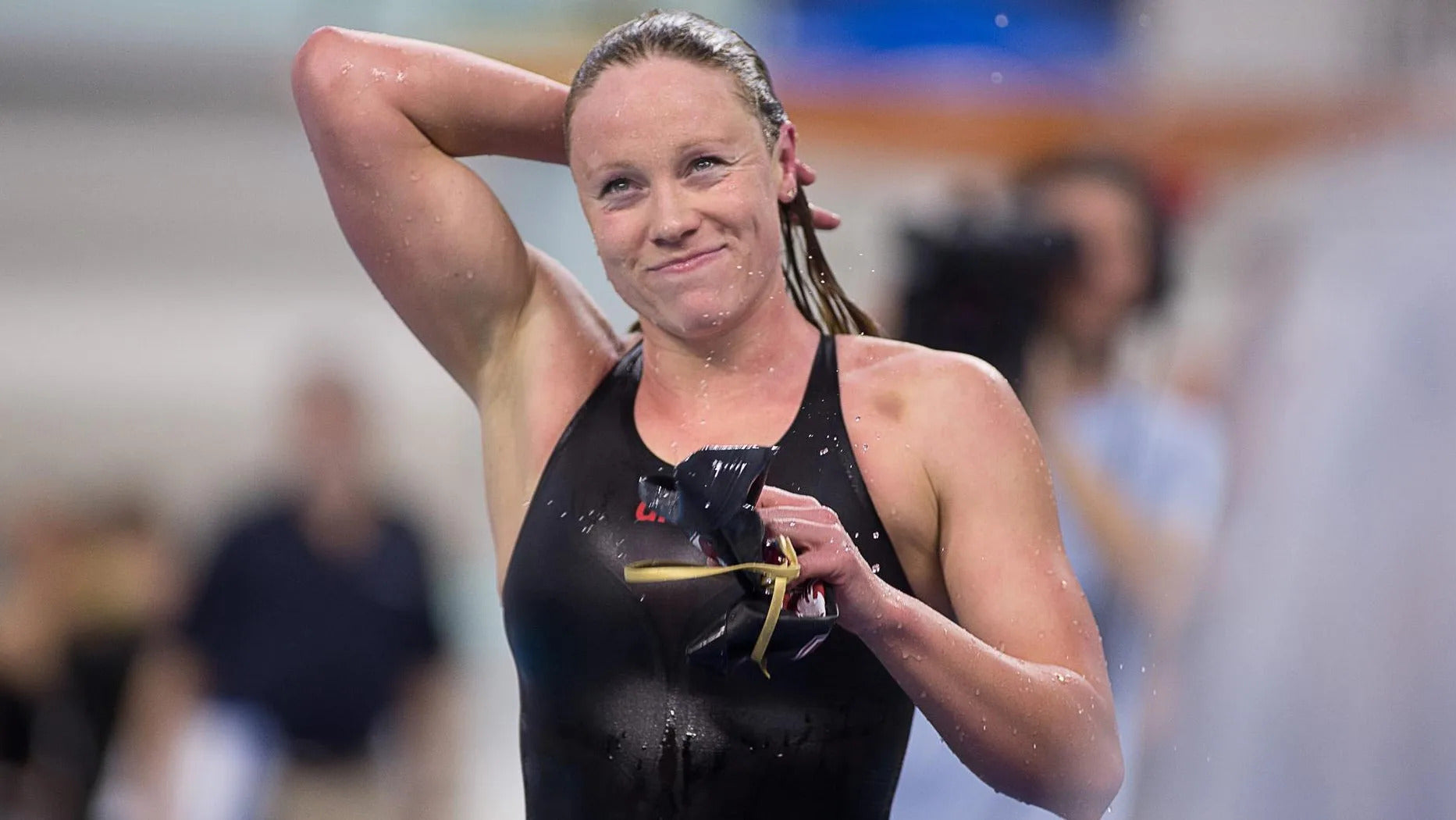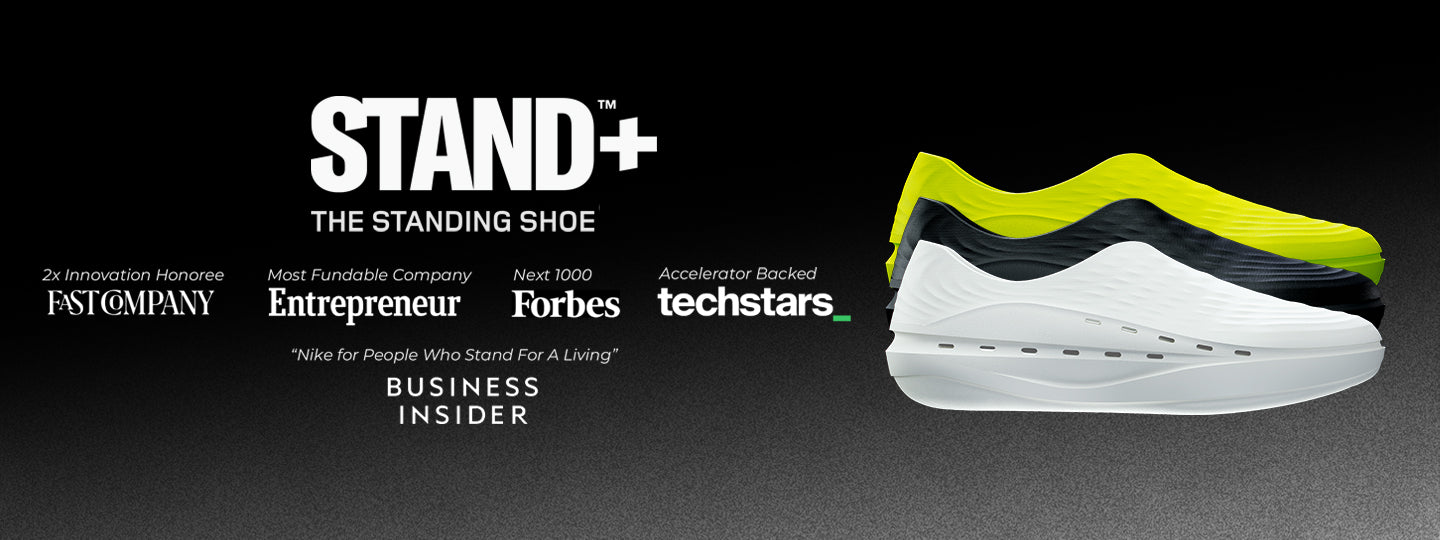
An Interview with Ella Eastin, American Swimmer: Part 1
STAND+ sat down with Ella Eastin, 12x National Swimming Champion and 4x American Record Holder, to discuss Ella’s athletic career, diagnosis with Postural Orthostatic Tachycardia Syndrome, and the significance of Women’s History Month.
STAND+
Hello, Ella, it's nice to see you! We are going to have an awesome conversation about who you are as a person, your amazing, incredible background and journey as an athlete, and how it plays into STAND+ and our mission along with Women's History Month; that's what March is dedicated to. We'll start really easy––tell us who you are and let's have the audience know a little bit about yourself!
Ella
Thank you for having me! My name is Ella Easton, I’m from California, I grew up in Orange County with an awesome family, my sister, and two parents, and I think the biggest part of my life journey started when I was really young. My parents wanted me and my sister to be water-safe and put us in the pool at a really early age––we fell in love with it right away. I've always been a pretty competitive person and so it was really fun when we started on a neighborhood swim team in my grandparent's neighborhood. I just fell in love with swimming from the start and I don't really have memories in life without, you know, it being around before that time at least. So that's something that has definitely defined me in a lot of ways and also just guided my life path.
I had a pretty normal childhood and worked really hard because I wanted to swim in college and I knew that you had to be a good student in order to do that. Ultimately I was really lucky to find myself at Stanford for undergrad and I had an amazing and really challenging experience during college. I grew a lot, changed a lot, and continued being competitive with swimming and finding some academic passions that I really dove into.
I was really, really lucky to be a part of a swim where we won multiple national championships ––three in a row––it really set me up for success on the professional stage, which was my ultimate goal from a really young age. I knew I wanted to go far with swimming and was willing to work really, really hard to get there, so I set my sights on the Olympics and the timing worked out well, where it was only going to be about one year after I graduated from college that I could go to Olympic trials and hopefully make the Olympic team. I graduated in 2019, finished with a human biology degree, and planned to go into healthcare after I was done with my swimming career, which, you know, I had planned to only be about one or two years maybe after college. I still was really focused on my academics and my career outside of swimming, but really was going to dedicate those couple of years to doing everything that I could to have one last push in the sport. After graduating, I started to train as a professional, doing some sponsorship work, and then traveling and competing a little bit more.
Every year we had a training trip where we went to Colorado Springs and swam at altitude for a couple of weeks to get some really hard training after Christmas. In January 2020, I came back from that trip and felt really excited about where my training was. It was just about six months from the Olympic trials and everyone knows that 2020 did not play out as planned, but it was particularly surprising how it played out for me.
When we got back from that training trip, I was in my normal routine––work out in the morning in the pool for a couple of hours, come home and make breakfast, take a nap, and do it all over again in the afternoon. I woke up from my nap one day, stood up out of bed, and went unconscious.
I found myself on the wood floor in my bedroom and didn't know what happened, but I started to feel really strange and never fully recovered. I went to see different doctors to figure out if something was wrong and initially I was like, “maybe I'm just really tired, I'm probably dehydrated” there were 1,000 things that could have been contributing to what I was feeling with how much I was pushing my body. I got back in the water a couple of days later and still wasn't feeling like myself. You know, I had trained for 18 years at this point and really knew my body so I knew something was wrong. It wasn't just fatigue, it wasn't just training super hard, there was something going on and unfortunately, this continued for months.
The Olympics actually got postponed a year, which I thought at the time was going to be my saving grace because I was going to be able to get healthy and then get back to training. That isn't what happened; after I started feeling sick, I finally got a diagnosis and found out that I have Chronic Fatigue Syndrome and Postural Orthostatic Tachycardia Syndrome, casually known as POTS which completely changed my life. I knew that it was going to be a long journey to recovery and that the eight months that I had until the next Olympics were not going to be quite long enough to heal myself and get back into training and peak condition. After spending about a year fighting my body, I decided that it was only fair to myself to fully invest in my recovery.
During that time, I was totally disabled and my mom was taking care of me full-time. My dad was really sick with Covid-19 for a couple of months so we had to stay away from him and it was challenging. What I really needed was physical and emotional rest. The moment I decided to step away from swimming I experienced the most healing. At that time, I also met my current partner who encouraged me to invest in my healthcare interest. [My partner] asked me, “have you ever considered going to medical school?” He encouraged me to give it some extra thought. The physician I was working with also inspired me by how he worked with patients that are diagnosed with chronic conditions that don't have a cure. I figured after going through [a diagnosis] myself, I feel the responsibility to contribute positively to this community.
I have been lucky to heal enough to go back to school and work towards having the honor and responsibility of taking care of patients like me. I ultimately decided to apply to medical school, so I'm currently at Stanford Medical working towards my degree and hopefully taking care of patients one day with chronic illness. I'm just really grateful for all the twists and turns that led me to where I am.
STAND+
Wow! What a story. I mean, from being an athlete and growing up with that discipline to uncovering and listening to your body and realizing something was off, advocating for yourself to find a diagnosis, to now being in medical school––I mean, what an example you are for a lot of people. For women too, which is exactly why we wanted to interview you for Women's History Month.
You shared your story with the STAND+ team and I think immediately we were drawn to it and drawn to the strength that we heard. We create shoes for frontline workers and, specifically, nurses and doctors have been one of our biggest audiences. Any way that we can show support––our mission––is the goal and that also seems to be yours as well; showing up for a profession that opened your eyes to what your body was experiencing.
I commend and applaud you because it’s not easy, I'm sure, to switch career paths and then decide to become a doctor and see things on that end. So, on that note, do you find in any way that there are similarities between being an athlete and working in healthcare? The STAND+ team often considers how we can show up for healthcare in the same way that athletes are being supported and I do think there’s a connection––do you feel like you've found that as well?
Ella
Absolutely! I think that my experience as a student-athlete set me up for success in medical school and hopefully into the future when I start practicing as a physician. From very early on in my swimming career, there was a huge emphasis on taking care of yourself in order to recover and be able to work hard day after day.
I think that throughout my career and particularly when I was sick, I was able to focus on finding the things that were restorative for me; people in nursing and medicine and all different healthcare careers emphasize taking care of others while oftentimes finding themselves to be the last priority. I've really tried to balance learning how to take care of myself to maximize the amount of help I'm able to provide. And I think my experience in athletics definitely helped me be able to establish some routines that I consider now non-negotiable. I obviously had a very high line of activity and I know that as a physician or nurse or anyone on their feet constantly it does build up a lot of endurance.
STAND+
I think support is definitely an underlying theme for a lot of people. I mean, that's part of our mission at STAND+ –– supporting frontline workers. Mental health for a doctor, nurse, frontline worker, health care worker, etcetera is so important. It’s difficult at times because like you said, frontline workers tend to do the helping. I'm sure you needed immense support too with figuring out your invisible illness. So, I want to talk about that a little bit and how you are balancing your illness in medical school, what you're doing for other people, and maybe for anybody who's listening who does have an invisible illness, what you would tell them if they are going through a diagnosis themselves?
Want to read Ella's answer? Click here for part 2 of the interview.
SHARE:
